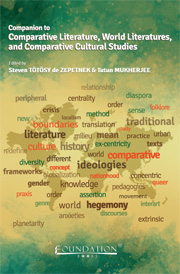Book contents
- Frontmatter
- Contents
- Introduction to the Companion to Comparative Literature, World Literatures, and Comparative Cultural Studies
- PART 1 Theories of Comparative Literature, World Literatures, and Comparative Cultural Studies
- PART 2 Comparative Literature in World Languages
- PART 3 Examples of New Work in Comparative Literature, World Literatures, and Comparative Cultural Studies
- African Literatures and Cultures and the Universal of Motherhood
- World literatures and the Case of Joyce, Rao, and Borges
- Abject Spaces and the Hinterland in Bolaño's Work
- The Motif of Fleeing in Gao's Work
- Arab Fiction and Migration in the Work of Haqqi and Salih
- Sexual Identity and Translation in Prime-Stevenson's Work
- The Notion of Life in the Work of Agamben
- Aesthetics, Opera, and Alterity in Herzog's Work
- An Intermedial Reading of Paley's Sita Sings the Blues
- Painting and Representation in Teaching Balzac
- PART 4 Multilingual Bibliography of Books in Comparative Literature, World Literatures, and Comparative Cultural Studies
- Index
World literatures and the Case of Joyce, Rao, and Borges
from PART 3 - Examples of New Work in Comparative Literature, World Literatures, and Comparative Cultural Studies
Published online by Cambridge University Press: 05 April 2014
- Frontmatter
- Contents
- Introduction to the Companion to Comparative Literature, World Literatures, and Comparative Cultural Studies
- PART 1 Theories of Comparative Literature, World Literatures, and Comparative Cultural Studies
- PART 2 Comparative Literature in World Languages
- PART 3 Examples of New Work in Comparative Literature, World Literatures, and Comparative Cultural Studies
- African Literatures and Cultures and the Universal of Motherhood
- World literatures and the Case of Joyce, Rao, and Borges
- Abject Spaces and the Hinterland in Bolaño's Work
- The Motif of Fleeing in Gao's Work
- Arab Fiction and Migration in the Work of Haqqi and Salih
- Sexual Identity and Translation in Prime-Stevenson's Work
- The Notion of Life in the Work of Agamben
- Aesthetics, Opera, and Alterity in Herzog's Work
- An Intermedial Reading of Paley's Sita Sings the Blues
- Painting and Representation in Teaching Balzac
- PART 4 Multilingual Bibliography of Books in Comparative Literature, World Literatures, and Comparative Cultural Studies
- Index
Summary
Abstract: In her article “World Literatures and the Example of Joyce, Rao, and Borges” Bhavya Tiwari discusses the work of James Joyce and poses the question why Joyce is considered an important figure in Latin America and South Asia. Have Indian languages (e.g., Bengali and Hindi) responded differently to Joycean aesthetics? If yes, can there be political reasons behind this difference? Joyce's own position in Europe as a modernist aesthetician complicates his reception in the “periphery,” India and Latin America. Hence, Tiwari queries as to what happens when Joyce's texts are received on two different continents. In this context, Tiwari discusses Joyce's Ulysses (1922), Raja Rao's Kanthapura (1938), and Jorge Luis Borges's texts with regard to their linguistic innovations and word play. Tiwari's comparative and contextual analysis is meant to illustrate the relevance of the study of comparative world literature.
Introduction
In The Translation Zone Emily Apter postulates that although there are “historical and pedagogical reasons for maintaining geopolitical relations between dominants and their former colonies, protectorates, and client states, there are equally compelling arguments for abandoning postcolonial geography” (87). Hence, “Francophone” would no longer “designate the transnational relations among metropolitan France and its former colonies, but linguistic contact zones all over the world in which French, or some kind of French, is one of many languages in play” (Apter 87). Indeed, globalizing postcolonial studies by freeing it from the “master” and “native” narrative would be a path to broaden our notions of language, politics, aesthetics, and translations.
- Type
- Chapter
- Information
- Companion to Comparative Literature, World Literatures, and Comparative Cultural Studies , pp. 382 - 396Publisher: Foundation BooksPrint publication year: 2014



